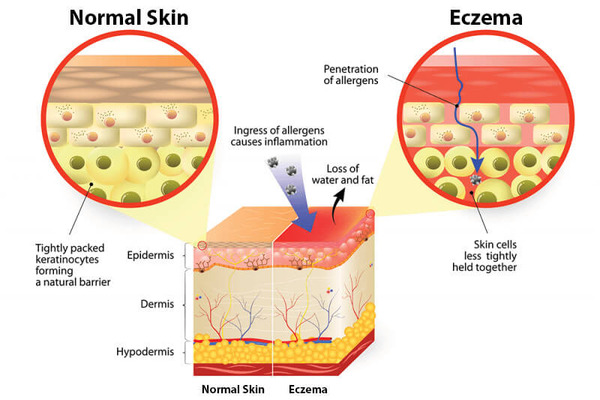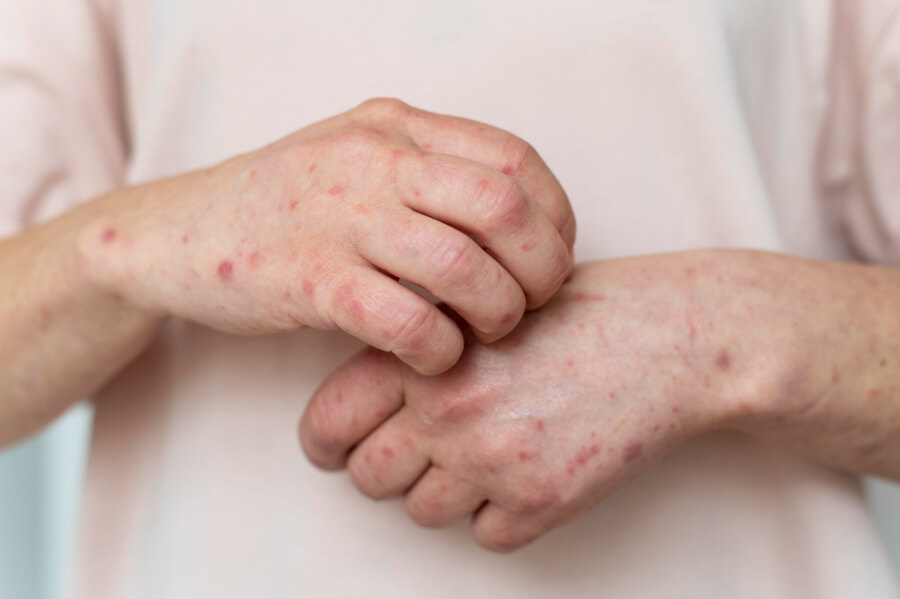Fitness & Wellness
Prevention for Eczema Flare-Up: Genetic Test
Eczema flare up & the science behind it
Eczema or eczema flare up is a multi-factorial inflammatory skin condition that is caused by a combination of genetic predisposition and environmental factors. It is a type of dermatitis that involves a localised inflammation of the skin that causes itching and redness. Blisters can also be caused by some types. This chronic skin condition is frequently linked to cutaneous hyper-reactivity as well as other atopic disorders like allergic rhinitis and asthma. Eczema, also known as atopic dermatitis, is the preferred term for skin inflammation associated with itching and rash, according to the World Allergy Organization, because not all eczema is caused by IgE-mediated allergen sensitivity.

Stages of Eczema (Eczema Flare Up)
It can be divided into three stages based on the age at which it first appears. During the first year of life, 60% of all eczema cases will appear (infantile eczema). Itching, redness, and small bumps on the cheeks, forehead, or scalp appear in 45% of all eczema cases in newborns aged two to six months and can subsequently extend to the body. Eczema eruptions in children usually develop between the ages of four and ten and are characterised by raised, itchy, scaly lumps on the face and/or trunk, as well as skin dryness and thickness. For adolescents, it occurs at or after puberty and is characterised by itchy, dry, scaly skin that can last throughout adulthood.
FLG Gene
The gene called FLG is a long stretch of DNA that codes for a protein called profilaggrin. The gene is so large, and the sequence is so complicated, that it was one of the last genes in the human genome to be sequenced completely. Changes in the DNA sequence of this gene have been discovered to predispose a person to eczema. Profilaggrin is produced by skin cells and plays a crucial role in protecting us from the outside environment. Since the discovery of a link between profilaggrin gene mutations and eczema in 2016, researchers have focused more on the pathophysiology of eczema from a ‘barrier malfunction’ perspective.

As it turns out, many people—possibly as many as 10% of people in some populations—have at least one FLG gene variant with a slightly altered DNA sequence. The amount of profilaggrin protein produced has been demonstrated to decrease because of these changes in the DNA sequence. As a result, the skin barrier is less effective at preventing both water loss and pathogen entry. Our skin monitors the humidity in our environment periodically, and when the humidity drops, skin cells make more of the profilaggrin protein to prevent water loss. With eczema, this implies that irritants such as pollen, mould, and some food allergens can get past the skin barrier and stimulate the immune system, resulting in inflammation and itching. Eczema is commonly missed because itching isn’t exclusive to the condition. Researchers discovered that patients with only one copy of the eczema-linked FLG gene have milder symptoms, implying that many people are unaware of the underlying reason for their itching.
Genetic testing, which includes an analysis of the FLG gene, allows people to discover more about their DNA and how it may be affecting their lives. Knowing if they are genetically prone to contracting eczema can help them keep on the lookout for symptoms.
Conclusion
Researchers have yet to come to decide whether or not eczema ever truly heals. Treatments are available, however, to mitigate the effects. Avoiding scratching, moisturising frequently with non-alcoholic moisturisers, and using a humidifier to maintain a humid atmosphere is among the at-home skin care tips recommended by physicians.
It is crucial to keep in mind that many people who are prone to eczema never get it. This emphasises the notion that DNA does not determine our fate, and the environment can have an impact on whether we develop illnesses like this.
Learn more about how our DNA test can help you. It’s considered the most advanced DNA test in Malaysia that we can provide, so we’d like to offer you our premium DNA test. You can take advantage of this offer and reap the benefits of getting a DNA test.


